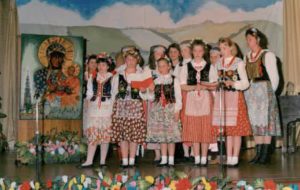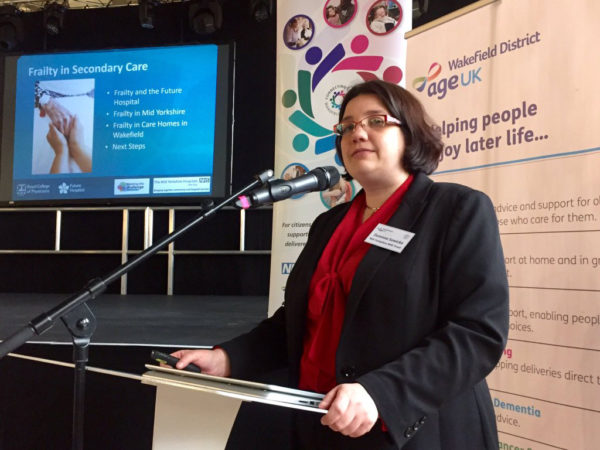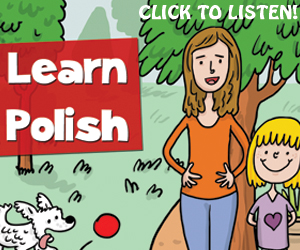“For me my Polish heritage is the norm and without it I would feel its loss,” says Zuzanna Sawicka, Consultant Physician and District Commissioner for Lancashire and Yorkshire in Polish Girl Guides in an interview with Brin Best.
Your job title is Consultant Physician in Elderly Medicine at Pinderfields Hospital, Mid Yorkshire NHS Trust. Could you describe a typical day at work?
“During my average week, I have a ward round on the acute admissions unit (mainly a morning), during which I assess older people who come to hospital with medical problems such as falls or infections. Other mornings, I have sessions where I go and visit residents in care homes, assess their medical problems and ensure their medication prescriptions are up-to-date and decisions are made to promote their ongoing health. My afternoons are spent in meetings about how we can develop our service, or in keeping up-to-date with administration (looking at results, writing letters or speaking to patients’ relatives).”
Does your Polish heritage influence your work in any way?
“My involvement in Polish Girl Guides has helped me in my work a great deal. I first became a Girl Guide when I was 11 years old, having been a Brownie from the age of six. From early on I made friends with other girls and boys from different backgrounds. One thing that was common to all of us was our Polish heritage. I learnt from an early age to be respectful to others and their opinions and to be tolerant, but most of all the importance of teamwork. Teamwork is fundamental in insuring the best care for people who are unwell. Underpinning a team there has to be a mutual respect of others’ opinions and skills. Working with the Girl Guides, I’ve learnt these skills in abundance. You might think that they could have been obtained from joining the English Girl Guides, but I’m not certain that this would have been the case.
Now I’m the District Commissioner for Lancashire and Yorkshire (Hufiec Kaszuby in Polish) I’m continuing to improve my management skills, including those needed to get the most out of people, which I can use in my work. It is such ‘transferable skills’ which have influenced the way I work and made me even more passionate about my Polish heritage.
Over the last few years, I’ve used my Polish language to translate for patients who speak very little English, or to understand test results that have been brought back from Poland. For example, I recently translated some investigation results to work out somebody’s allergy status, so they could have further tests to work out what was wrong with them.
 On other occasions I have translated patients’ histories and helped other consultants to make a diagnosis. It is not only very fulfilling to be able to use my Polish language skills, but also a great comfort to individuals.
On other occasions I have translated patients’ histories and helped other consultants to make a diagnosis. It is not only very fulfilling to be able to use my Polish language skills, but also a great comfort to individuals.
As a very junior doctor I was asked to translate for a man who had been shot and was at risk of having his leg amputated. He explained that a translator had been called, but that person became very emotional when they were telling the man he may lose his leg. He was grateful that someone more objective had been found. By translating a number of times I learnt all about individuals and this helped me understand more about the effects of trauma on a person, especially when they are so far away from home. It’s extremely gratifying to be able to help those in need in such difficult situations when they are feeling so vulnerable – especially if they are new in the United Kingdom.
In my current job my employer has four ‘core values’ and these are very similar to the values that I grew up with within a Polish home. For example, I’ve always had a respect for my elders. I was taught at an early age the role that individual members of my family played in World War II and what hardships my grandparents experienced, both back in Poland and when they arrived here in the UK. I have huge respect for people who lived through the war, and it helps me to understand how my patients’ lives have been affected by this conflict.
On arrival in England, other than the initial help to set up a home life and find jobs, all other funding for the formation of Polish communities and Polish schools was raised by Poles themselves. For example, my grandfather Leon rode his bicycle around the streets of Coventry to get donations from other Polish families to support a parish priest in that city. For these early ‘immigrants’ the Polish communities were very important because they were built to ensure that they maintained their Polish heritage, so someday they could return to Poland.
Polish people tend to be very family-orientated, and this has been especially so after World Zuzanna and Zygmunt’s wedding in 2003 War II, when many families lost loved ones. I was always exposed to a caring and loving family, which again helps me with my work.
When my grandparents arrived in England they had nothing and my parents were therefore encouraged to make a positive impact on society through their careers. My mother is a headteacher and my father an engineer. My brother and I were always encouraged to do our best and be pleased with our achievements. From an early age I was encouraged to do well and continue to improve, and this is part of my work ethos to this day.
Having to go to Polish Saturday School, as well as mainstream school, I always had to manage my work for school in an effective manner, but I was also encouraged to do my best to the highest standard. Working to a high standard has for me become the norm and continues to influence the way I approach the challenges I face in medicine.
Through the years I’ve also been part of the Polish Medical Association. This has been an important part of my professional development. It has allowed me to attend lectures organised specifically for Polish doctors and medical professionals, and often given by those who have links with Poland. The most memorable lecture I attended was given by Dame Cicely Saunders, the founder of the hospice movement, in the Sikorski Museum in London. She fell in love with a number of Poles over the years, most notably her husband, the painter Marian Bohusz-Szyszko.
I’ve also had the opportunity to be able to read Polish literature on subjects which interest me and have been able to help translate articles into English for use by other medical professionals. Additionally, I’ve used my language skills to write articles related to health in a Polish newsletter, which was published in Leeds for many years.”
Could you describe your links to the Polish community outside your work?
“I moved to Leeds in 1997 to study medicine and took over running the Polish Girl Guides group in the city. I’m now District Commissioner for Yorkshire and Lancashire for the Polish Girl Guide movement. I’m also a qualified instructor and regularly take groups of children away for activities. In 2003 my husband Zygmunt became chairman of the Polish Catholic Parish Council in Leeds, and we have continued to be part of this community to this day. Most recently I’ve been the vice-chairperson of the committee, but have also held the position of social secretary.
Maintaining our Polish heritage is important to me and my husband and we’ve therefore been eager to ensure our daughters attend the Polish Saturday School in Leeds. They have attended since they were four years old and both manage to keep up with children who have just arrived from Poland, despite being fourth generation Poles, which is remarkable. Nine years ago I began Iskierka, a weekly bulletin to help children in the parish learn about the Catholic faith. It is now sent electronically to other parishes in England, such as in Huddersfield and Stratford-on-Avon, and is even sent as far afield as Hungary.”
Why do you still feel your Polish heritage is important, given that your immediate family have not lived in Poland for over 50 years?
“Your roots are who you are. If I turned away now from my Polish heritage I would see it as very disrespectful to my great-grandparents and grandparents. They went through so much in World War II and afterwards to ensure we had a brighter future. For me my Polish heritage is the norm and without it I would feel its loss. I have cousins who do not speak Polish and see the effect that this has had on their lives, and I pity them that they have lost their Polish links. I remember my mother always having to persuade my brother to go into Polish school. He now, having spent time in Poland during his studies, has a doctorate in philosophy which investigated the economic links between the West Midlands and the Lower Silesia region in Poland. Furthermore, this summer he is to marry in Poland and I’m therefore certain my greatgrandparents’ and grandparents’ legacy will continue. It is to them and to my parents that I owe the greatest debt.”
***
 This interview was carried out as part of the ‘Poles in the UK’ project, and was first published in the book Poles in the UK: A Story of Friendship and Cooperation (by Brin Best & Maria Helena Żukowska, 2016).
This interview was carried out as part of the ‘Poles in the UK’ project, and was first published in the book Poles in the UK: A Story of Friendship and Cooperation (by Brin Best & Maria Helena Żukowska, 2016).
For more details see the Poles in the UK Facebook page and www.polesintheuk.net.











![Czy to możliwe? Laxton Hall po raz szesnasty! [ZDJĘCIA]](https://www.tydzien.co.uk/wp-content/themes/LondonLive/thumb.php?src=/media/2024/06/Głowne-zdjęcie-do-artykułu-nr-3-600x400.jpg&w=95&h=74&zc=1&q=100)



